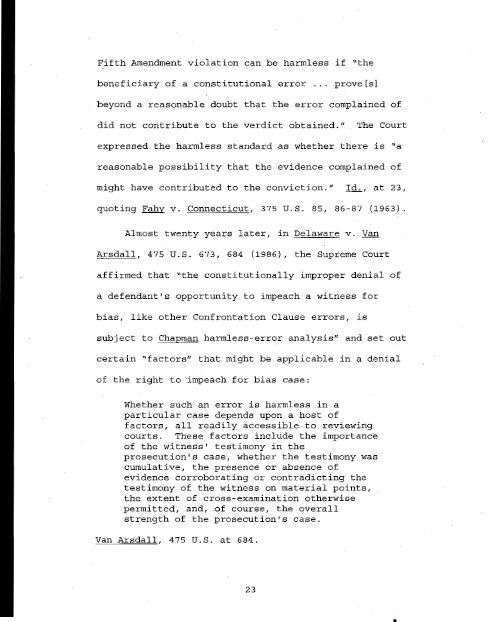463 Mass. 353 - Appellee Commonwealth Brief - Mass Cases
463 Mass. 353 - Appellee Commonwealth Brief - Mass Cases 463 Mass. 353 - Appellee Commonwealth Brief - Mass Cases
Fifth Amendment violation can be harmless if "the beneficiary of a constitutional error ... prove[s] beyond a reasonable doubt that the error complained of did not contribute to the verdict obtained." The Court expressed the harmless standard as whether there is "a reasonable possibility that the evidence complained of might have contributed to the conviction." Id., at 23, quoting Fahy v. Connecticut, 375 U.S. 85, 86-87 (1963) Almost twenty years later, in Delaware v. Van Arsdall, 475 U.S. 673, 684 (1986), the Supreme Court affirmed that "the constitutionally improper denial of a defendant's opportunity to impeach a witness for bias, like other Confrontation Clause errors, is subject to Chapman harmless-error analysis" and set out certain "factors" that might be applicable in a denial of the right to impeach for bias case: Whether such an error is harmless in a particular case depends upon a host of factors, all readily accessible to reviewing courts. These factors include the importance of the witness' testimony in the prosecution's case, whether the testimony was cumulative, the presence or absence of evidence corroborating or contradicting the testimony of the witness on material points, the extent of cross-examination otherwise permitted, and, of course, the overall strength of the prosecution's case. VanArsdall, 475 U.S. at 684. 23
- Page 1 and 2: COMMONWEALTH OF .MASSACHUSETTS SUPR
- Page 3 and 4: B. Applying the Degraca/Mahdi Facto
- Page 5 and 6: Cases Commonwealth v. Degraca, 447
- Page 7 and 8: Cases Commonwealth v. Todisco, 363
- Page 9 and 10: COMMONWEALTH OF MASSACHUSETTS SUPRE
- Page 11 and 12: The defendants moved to suppress ev
- Page 13: in a primarily residential neighbor
- Page 17: informants are used in drug investi
- Page 20 and 21: (an eighth of an·ounce of cocaine)
- Page 23: etween the defendants' drug dealing
- Page 26 and 27: 431 (1992), or the informant has pr
- Page 28 and 29: Blake, 413 Mass. 823, 828 (1992). N
- Page 32: Three years before Van Arsdall was
- Page 35 and 36: medical examiner, the "premise of t
- Page 37 and 38: findings of guilty." Vasquez, 456 M
- Page 39 and 40: Ronald Mendes is in error when he c
- Page 42 and 43: in the case of a violation of a def
- Page 44 and 45: 767 (2005), where the defendant's d
- Page 46: of the Commonwealth's case and were
- Page 50 and 51: He acknowledged "the cocaine that w
- Page 52 and 53: marijuana, as admitted by the defen
- Page 54 and 55: A. Detective Hyde's Testimony Conce
- Page 56 and 57: G. L. c. 272, § 99(B) (4). Detecti
- Page 58: cellular telephone during booking w
Fifth Amendment violation can be harmless if "the<br />
beneficiary of a constitutional error ... prove[s]<br />
beyond a reasonable doubt that the error complained of<br />
did not contribute to the verdict obtained." The Court<br />
expressed the harmless standard as whether there is "a<br />
reasonable possibility that the evidence complained of<br />
might have contributed to the conviction." Id., at 23,<br />
quoting Fahy v. Connecticut, 375 U.S. 85, 86-87 (1963)<br />
Almost twenty years later, in Delaware v. Van<br />
Arsdall, 475 U.S. 673, 684 (1986), the Supreme Court<br />
affirmed that "the constitutionally improper denial of<br />
a defendant's opportunity to impeach a witness for<br />
bias, like other Confrontation Clause errors, is<br />
subject to Chapman harmless-error analysis" and set out<br />
certain "factors" that might be applicable in a denial<br />
of the right to impeach for bias case:<br />
Whether such an error is harmless in a<br />
particular case depends upon a host of<br />
factors, all readily accessible to reviewing<br />
courts. These factors include the importance<br />
of the witness' testimony in the<br />
prosecution's case, whether the testimony was<br />
cumulative, the presence or absence of<br />
evidence corroborating or contradicting the<br />
testimony of the witness on material points,<br />
the extent of cross-examination otherwise<br />
permitted, and, of course, the overall<br />
strength of the prosecution's case.<br />
VanArsdall, 475 U.S. at 684.<br />
23



